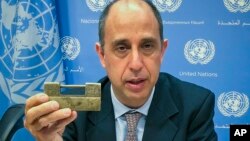A United Nations investigator finds the easing of tensions on the Korean Peninsula has done nothing to improve human rights in North Korea, saying the situation remains widespread and in violation of international human rights law. The investigator submitted his report to the U.N. human rights council in Geneva on Monday.
U.N. special investigator Tomas Ojea Quintana welcomes the interaction between the United States and North Korea over that country’s nuclear program. He says meetings between leaders of the two countries can build trust and move toward the goal of creating a permanent peace.
But he says this high-level diplomatic track is having no impact on alleviating the serious humanitarian problems affecting the population. He says more than 10 million people, or 41 percent of the population, continue to suffer from lack of food and access to essential health services, clean water and sanitation. He notes international and bilateral sanctions are making things worse.
Ojea Quintana says he is particularly concerned about serious human rights violations in North Korea’s detention and prison system. He says people sent to political prison camps have no legal rights.
“I also received reports pointing to widespread and systematic torture and ill-treatment in detention facilities," he said. "North Korean citizens who are detained in China are repatriated and have stated that they are subject to torture, cruel or degrading treatment.”
Ojea Quintana says prisoners reportedly are being kept in cramped cells with inadequate water, sanitation and hygiene. He says they do not receive adequate food or health care and are subject to forced labor in dangerous conditions.
The U.N. investigator is urging the government to allow international monitors to access these camps and to start releasing prisoners. He also calls on China and other countries to protect North Koreans who arrive on their territory as refugees and to not send them back to North Korea where they face many risks.
North Korea, which has refused to cooperate with Ojea Quintana or grant him access to the country, boycotted his presentation. The delegation did not bother to use its right of reply as a concerned country.











